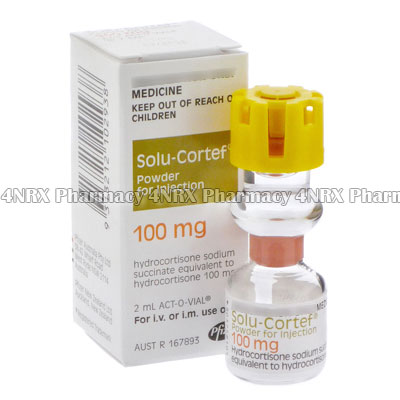 |
Home  Generics Generics  Solu-Cortef Injection (Hydrocortisone Sodium Succinate) Solu-Cortef Injection (Hydrocortisone Sodium Succinate) |
|
|||||||||
|
|
Solu-Cortef Injection (Hydrocortisone Sodium Succinate)
What is Solu-Cortef Injection (Hydrocortisone Sodium Succinate) used for? Solu-Cortef Injection (Hydrocortisone Sodium Succinate) is an injectable corticosteroid used for emergency situations requiring immediate treatment. It prevents the actions of enzymes in the body that cause inflammation, swelling, and discomfort to rapidly relieve conditions such as severe allergic reactions, dangerous drops in blood pressure, ulcerative colitis, Crohn`s disease, lupus, or certain surgical emergencies. Your doctor may also use this medication for the treatment of other unlisted conditions. How should I use Solu-Cortef Injection (Hydrocortisone Sodium Succinate)? Solu-Cortef Injection (Hydrocortisone Sodium Succinate) should always be administered by your doctor or a fully trained health care professional. If you or someone close to you is required to perform the injection, make sure you are fully instructed in the correct procedure to prevent serious complications that may occur. The correct dosage will be determined entirely based on your age, weight, current health, the condition being treated, and the severity of your symptoms. Sterilize the needle and the injection site, collect the correct amount of solution into the syringe, hold it upright while tapping it and pressing the plunger until a small amount of medicine emerges, and inject it into a muscle or vein. Always observe the medication prior to use to make sure it is not cloudy or discoloured as this may indicate contamination. Ask your pharmacist or doctor any questions you have about the medicine to ensure the correct administration. What are the side effects of Solu-Cortef Injection (Hydrocortisone Sodium Succinate)? Solu-Cortef Injection (Hydrocortisone Sodium Succinate) may cause side effects in some patients including:
Serious side effects that may require emergency medical attention are oral thrush, elevated blood sugar levels, muscle weakness, signs of an infection, Cushing`s syndrome, thinning skin, easier bruising, slowed growth rate in children, intracranial pressure, thromboembolism, oedema, increased potassium levels in the blood, osteoporosis, disturbed menstrual periods, adrenal suppression, severe hypertension, or unusual mood changes such as anxiety or depression. Contact your doctor immediately if you experience any serious or worrying symptoms to make sure the correct alterations are made to your dosage or application frequency to prevent more health problems from appearing. Please Note Solu-Cortef Injection (Hydrocortisone Sodium Succinate) should not be used to treat patients with an untreated widespread infection or with a recent stroke or head injury. Also inform your doctor if the patient is elderly, a child, a woman who has gone through menopause, or has epilepsy, a peptic ulcer, hypokalaemia, myasthenia gravis, hypertension, glaucoma, heart failure, diverticulitis, thrombophlebitis, recent heart attack, ulcerative colitis, osteoporosis, diabetes, hypothyroidism, history of mental illness, history of tuberculosis, herpes affecting the eye, liver cirrhosis, decreased liver function, or liver failure. These conditions may cause unexpected health problems requiring special alterations to your treatment. Strictly use Solu-Cortef Injection (Hydrocortisone Sodium Succinate) as prescribed and follow all instructions provided by your doctor. Safe, suitable, and optimum dosage can vary and is dependent on the patient`s health and medical history, as well as the condition you are treating. Solu-Cortef Injection (Hydrocortisone Sodium Succinate) may not be safe or suitable for all patients. Always ensure your doctor is informed if you are pregnant or breastfeeding, using any other type of medication (including non-prescription medicine, vitamins, and supplements), as well as if you have any allergies, other illnesses, or pre-existing medication conditions. Seek immediate medical attention or proceed to your nearest accident and emergency department if you suffer a hypersensitive or allergic reaction. Symptoms usually present during a reaction of this nature include difficulty breathing or swallowing, swelling of the limbs or face, tight chest, hives, and skin rashes. 
|
||||||||||||||||||